2014年江苏省海头中学高考英语一模试题(附答案)
- 格式:doc
- 大小:136.00 KB
- 文档页数:17
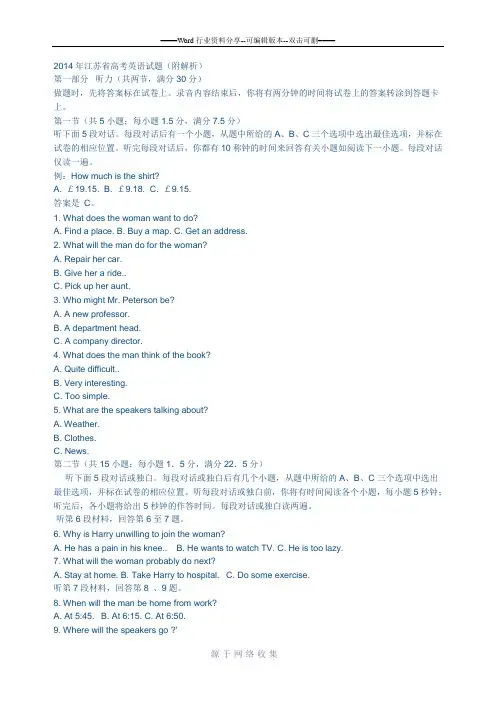
2014年江苏省高考英语试题(附解析)第一部分听力(共两节,满分30分)做题时,先将答案标在试卷上。
录音内容结束后,你将有两分钟的时间将试卷上的答案转涂到答题卡上。
第一节(共5小题;每小题1.5分,满分7.5分)听下面5段对话。
每段对话后有一个小题,从题中所给的A、B、C三个选项中选出最佳选项,并标在试卷的相应位置。
听完每段对话后,你都有10称钟的时间来回答有关小题如阅读下一小题。
每段对话仅读一遍。
例:How much is the shirt?A. £19.15.B. £9.18.C. £9.15.答案是C。
1. What does the woman want to do?A. Find a place.B. Buy a map.C. Get an address.2. What will the man do for the woman?A. Repair her car.B. Give her a ride..C. Pick up her aunt.3. Who might Mr. Peterson be?A. A new professor.B. A department head.C. A company director.4. What does the man think of the book?A. Quite difficult..B. Very interesting.C. Too simple.5. What are the speakers talking about?A. Weather.B. Clothes.C. News.第二节(共15小题;每小题1.5分,满分22.5分)听下面5段对话或独白。
每段对话或独白后有几个小题,从题中所给的A、B、C三个选项中选出最佳选项,并标在试卷的相应位置。
听每段对话或独白前,你将有时间阅读各个小题,每小题5秒钟;听完后,各小题将给出5秒钟的作答时间。
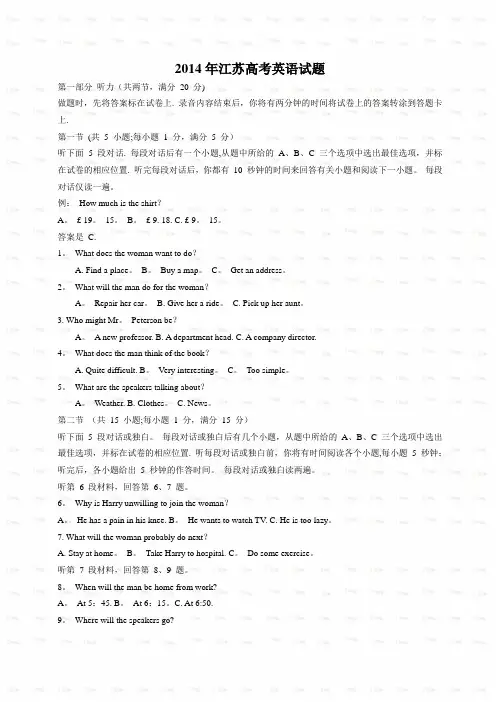
2014年江苏高考英语试题第一部分听力(共两节,满分20 分)做题时,先将答案标在试卷上. 录音内容结束后,你将有两分钟的时间将试卷上的答案转涂到答题卡上.第一节(共5 小题;每小题1 分,满分5 分)听下面 5 段对话. 每段对话后有一个小题,从题中所给的A、B、C 三个选项中选出最佳选项,并标在试卷的相应位置. 听完每段对话后,你都有10 秒钟的时间来回答有关小题和阅读下一小题。
每段对话仅读一遍。
例:How much is the shirt?A。
£ 19。
15。
B。
£ 9. 18. C. £ 9。
15。
答案是C.1。
What does the woman want to do?A. Find a place。
B。
Buy a map。
C。
Get an address。
2。
What will the man do for the woman?A。
Repair her car。
B. Give her a ride。
C. Pick up her aunt。
3. Who might Mr。
Peterson be?A。
A new professor. B. A department head. C. A company director.4。
What does the man think of the book?A. Quite difficult. B。
Very interesting。
C。
Too simple。
5。
What are the speakers talking about?A。
Weather. B. Clothes。
C. News。
第二节(共15 小题;每小题 1 分,满分15 分)听下面5 段对话或独白。
每段对话或独白后有几个小题,从题中所给的A、B、C 三个选项中选出最佳选项,并标在试卷的相应位置. 听每段对话或独白前,你将有时间阅读各个小题,每小题5 秒钟;听完后,各小题给出5 秒钟的作答时间。
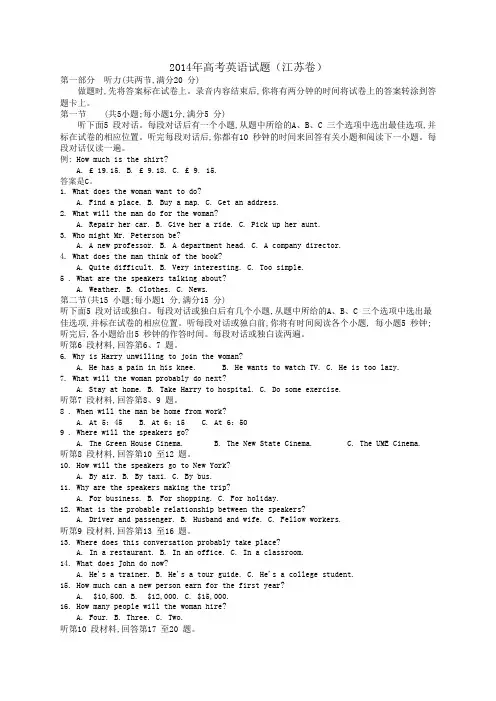
2014年高考英语试题(江苏卷)第一部分听力(共两节,满分20 分)做题时,先将答案标在试卷上。
录音内容结束后,你将有两分钟的时间将试卷上的答案转涂到答题卡上。
第一节 (共5小题;每小题1分,满分5 分)听下面5 段对话。
每段对话后有一个小题,从题中所给的A、B、C 三个选项中选出最佳选项,并标在试卷的相应位置。
听完每段对话后,你都有10 秒钟的时间来回答有关小题和阅读下一小题。
每段对话仅读一遍。
例: How much is the shirt?A. £ 19.15.B. £ 9.18.C. £ 9. 15.答案是C。
1. What does the woman want to do?A. Find a place.B. Buy a map.C. Get an address.2. What will the man do for the woman?A. Repair her car.B. Give her a ride.C. Pick up her aunt.3. Who might Mr. Peterson be?A. A new professor.B. A department head.C. A company director.4. What does the man think of the book?A. Quite difficult.B. Very interesting.C. Too simple.5 . What are the speakers talking about?A. Weather.B. Clothes.C. News.第二节(共15 小题;每小题1 分,满分15 分)听下面5 段对话或独白。
每段对话或独白后有几个小题,从题中所给的A、B、C 三个选项中选出最佳选项,并标在试卷的相应位置。
听每段对话或独白前,你将有时间阅读各个小题, 每小题5 秒钟;听完后,各小题给出5 秒钟的作答时间。
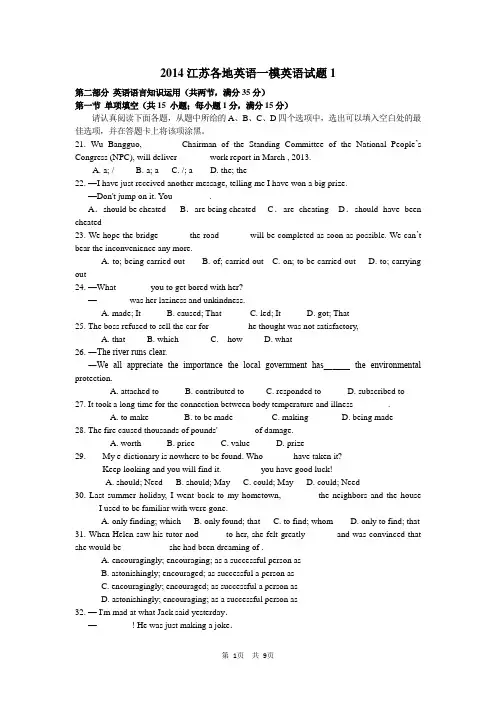
2014江苏各地英语一模英语试题1第二部分英语语言知识运用(共两节,满分35分)第一节单项填空(共15 小题;每小题1分,满分15分)请认真阅读下面各题,从题中所给的A、B、C、D四个选项中,选出可以填入空白处的最佳选项,并在答题卡上将该项涂黑。
21. Wu Bangguo, _______ Chairman of the Standing Committee of the National People’s Congress (NPC), will deliver_______ work report in March , 2013.A. a; /B. a; aC. /; aD. the; the22. —I have just received another message, telling me I have won a big prize.—Don't jump on it. You ________.A.should be cheated B.are being cheated C.are cheating D.should have been cheated23. We hope the bridge ______ the road ______ will be completed as soon as possible. We can’t bear the inconvenience any more.A. to; being carried outB. of; carried outC. on; to be carried outD. to; carrying out24. —What _______ you to get bored with her?— _______was her laziness and unkindness.A. made; ItB. caused; ThatC. led; ItD. got; That25. The boss refused to sell the car for ________ he thought was not satisfactory,A. thatB. whichC. howD. what26. ―The river runs clear.―We all appreciate the importance the local government has______ the environmental protection.A. attached toB. contributed toC. responded toD. subscribed to27. It took a long time for the connection between body temperature and illness________.A. to makeB. to be madeC. makingD. being made28. The fire caused thousands of pounds' ________of damage.A. worthB. priceC. valueD. prize29. -----My e-dictionary is nowhere to be found. Who ______ have taken it?-----Keep looking and you will find it. ________ you have good luck!A. should; NeedB. should; MayC. could; MayD. could; Need30. Last summer holiday, I went back to my hometown, _______ the neighbors and the house _____ I used to be familiar with were gone.A. only finding; whichB. only found; thatC. to find; whomD. only to find; that31. When Helen saw his tutor nod _____ to her, she felt greatly ______ and was convinced that she would be __________ she had been dreaming of .A. encouragingly; encouraging; as a successful person asB. astonishingly; encouraged; as successful a person asC. encouragingly; encouraged; as successful a person asD. astonishingly; encouraging; as a successful person as32. — I'm mad at what Jack said yesterday.—________! He was just making a joke.A. Take your timeB. Lighten upC. Enjoy yourselfD. Not at all33. The moment _____ Leo will never forget is _____ Mr. Smith gave him a lot of valuable advice on how to improve his writing.A. that; thatB. when; thatC. when; /D. that; when34. Thank you so much! But for your text message, I ______ home without my ID card yesterday.A. would have leftB. would leaveC. had leftD. left35. ------I followed your advice on how to learn English, but I am still poor in it. Why?------Well, __________.A. all is well that ends well.B. one man’s meat is another man’s poison.C. no pains, no gains.D. no sweet without sweat.第二节完形填空(共20小题;每小题1分,满分20分)请认真阅读下面短文,从短文后各题所给的A、B、C、D四个选项中,选出最佳选项,并在答题卡上将该项涂黑。
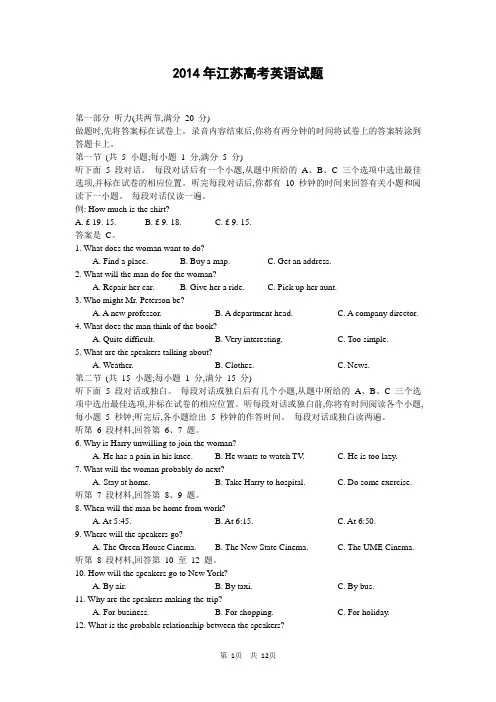
2014年江苏高考英语试题第一部分听力(共两节,满分20 分)做题时,先将答案标在试卷上。
录音内容结束后,你将有两分钟的时间将试卷上的答案转涂到答题卡上。
第一节(共5 小题;每小题1 分,满分5 分)听下面 5 段对话。
每段对话后有一个小题,从题中所给的A、B、C 三个选项中选出最佳选项,并标在试卷的相应位置。
听完每段对话后,你都有10 秒钟的时间来回答有关小题和阅读下一小题。
每段对话仅读一遍。
例: How much is the shirt?A. £ 19. 15.B. £ 9. 18.C. £ 9. 15.答案是C。
1. What does the woman want to do?A. Find a place.B. Buy a map.C. Get an address.2. What will the man do for the woman?A. Repair her car.B. Give her a ride.C. Pick up her aunt.3. Who might Mr. Peterson be?A. A new professor.B. A department head.C. A company director.4. What does the man think of the book?A. Quite difficult.B. Very interesting.C. Too simple.5. What are the speakers talking about?A. Weather.B. Clothes.C. News.第二节(共15 小题;每小题 1 分,满分15 分)听下面 5 段对话或独白。
每段对话或独白后有几个小题,从题中所给的A、B、C 三个选项中选出最佳选项,并标在试卷的相应位置。
听每段对话或独白前,你将有时间阅读各个小题,每小题5 秒钟;听完后,各小题给出5 秒钟的作答时间。
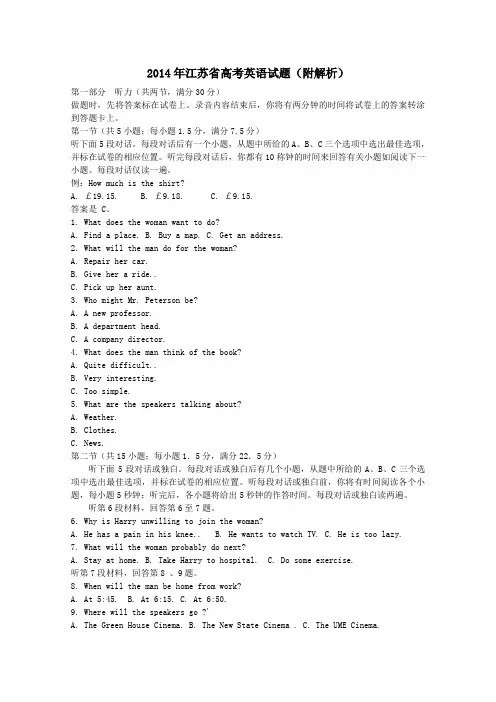
2014年江苏省高考英语试题(附解析)第一部分听力(共两节,满分30分)做题时,先将答案标在试卷上。
录音内容结束后,你将有两分钟的时间将试卷上的答案转涂到答题卡上。
第一节(共5小题;每小题1.5分,满分7.5分)听下面5段对话。
每段对话后有一个小题,从题中所给的A、B、C三个选项中选出最佳选项,并标在试卷的相应位置。
听完每段对话后,你都有10称钟的时间来回答有关小题如阅读下一小题。
每段对话仅读一遍。
例:How much is the shirt?A. £19.15.B. £9.18.C. £9.15.答案是 C。
1. What does the woman want to do?A. Find a place.B. Buy a map.C. Get an address.2. What will the man do for the woman?A. Repair her car.B. Give her a ride..C. Pick up her aunt.3. Who might Mr. Peterson be?A. A new professor.B. A department head.C. A company director.4. What does the man think of the book?A. Quite difficult..B. Very interesting.C. Too simple.5. What are the speakers talking about?A. Weather.B. Clothes.C. News.第二节(共15小题;每小题1.5分,满分22.5分)听下面5段对话或独白。
每段对话或独白后有几个小题,从题中所给的A、B、C三个选项中选出最佳选项,并标在试卷的相应位置。
听每段对话或独白前,你将有时间阅读各个小题,每小题5秒钟;听完后,各小题将给出5秒钟的作答时间。
掌门1对1教育高考真题2014年江苏省高考英语试题(附解析)第一部分听力(共两节,满分30分)做题时,先将答案标在试卷上。
录音内容结束后,你将有两分钟的时间将试卷上的答案转涂到答题卡上。
第一节(共5小题;每小题1.5分,满分7.5分)听下面5段对话。
每段对话后有一个小题,从题中所给的A、B、C三个选项中选出最佳选项,并标在试卷的相应位置。
听完每段对话后,你都有10称钟的时间来回答有关小题如阅读下一小题。
每段对话仅读一遍。
例:How much is the shirt?A. £19.15.B. £9.18.C. £9.15.答案是C。
1. What does the woman want to do?A. Find a place.B. Buy a map.C. Get an address.2. What will the man do for the woman?A. Repair her car.B. Give her a ride..C. Pick up her aunt.3. Who might Mr. Peterson be?A. A new professor.B. A department head.C. A company director.4. What does the man think of the book?A. Quite difficult..B. Very interesting.C. Too simple.5. What are the speakers talking about?A. Weather.B. Clothes.C. News.第二节(共15小题;每小题1.5分,满分22.5分)听下面5段对话或独白。
每段对话或独白后有几个小题,从题中所给的A、B、C三个选项中选出最佳选项,并标在试卷的相应位置。
听每段对话或独白前,你将有时间阅读各个小题,每小题5秒钟;听完后,各小题将给出5秒钟的作答时间。
2014年江苏高考英语试卷及答案第一部分听力(共两节,满分20 分)做题时,先将答案标在试卷上。
录音内容结束后,你将有两分钟的时间将试卷上的答案转涂到答题卡上。
第一节摇 (共5 小题;每小题1 分,满分5 分)听下面5 段对话。
每段对话后有一个小题,从题中所给的A、B、C 三个选项中选出最佳选项,并标在试卷的相应位置。
听完每段对话后,你都有10 秒钟的时间来回答有关小题和阅读下一小题。
每段对话仅读一遍。
例: How much is the shirt?A. £19. 15.B. £9. 18.C. £9. 15. 答案是 C。
1.What does the woman want to do?A. Find a place.B. Buy a map.C. Get an address.2. What will the man do for the woman?A. Repair her car.B. Give her a ride.C. Pick up her aunt.3. Who might Mr.Peterson be?A. A new professor.B. A department head.C. A company director.4. What does the man think of the book?A. Quite difficult.B. Very interesting.C. Too simple.5. What are the speakers talking about?A. Weather.B. Clothes.C. News.第二节 (共15 小题;每小题1 分,满分15 分)听下面5 段对话或独白。
每段对话或独白后有几个小题,从题中所给的A、B、C 三个选项中选出最佳选项,并标在试卷的相应位置。
听每段对话或独白前,你将有时间阅读各个小题, 每小题5 秒钟;听完后,各小题给出5 秒钟的作答时间。
2014年高考模拟考试英语试题第I卷(共105分)第一部分听力(共两节,满分30分)该部分分为第一、第二两节。
注意:回答听力部分时,请先将答案标在试卷上。
听力部分结束前,你将有两分钟的时间将你的答案转涂到客观题答题卡上。
第一节(共5小题;每小题1.5分,满分7.5分)听下面5段对话。
每段对话后有一个小题,从题中所给的A、B、C三个选项中选出最佳项,并标在试卷的相应位置。
听完每段对话后,你都有10秒钟的时间来回答有关小题和阅读下一小题。
每段对话仅读一遍。
1、At what time will the woman wake her son up?A、7:15B、7:45C、7:502、When will the man go on holiday/A、In juneB、In julyC、In August3、How did the woman come to the city?A、On footB、By busC、By car4、What does the girl mean?A、The girls got along well with each otherB、It’s understandable that girls don’t get alongC、The girls lacked the courage to fight5、What’s the man’s advice for the owman?A、To lose weightB、To save moneyC、To tie a belt第二节(共15小题;每小题1.5分,满分22.5分)听下面5段对话或独白。
每段对话或独白后有几个小题,从题中所给的A、B、C三个选项中选出最佳选项,并标在试卷的相应位置。
听完每段对话或独白前,你将有时间阅读各个小题,每小题5秒钟;听完后,各小题将给出5秒钟的作答时间。
每段对话或独白读两遍。
听第6段材料,回答第6至8题。
2014年高考模拟英语试卷(含听力)本试卷分为第Ⅰ卷(选择题)和第Ⅱ卷(非选择题)两部分.共150分,考试时间120分钟.第I卷第一部分:听力(共两节,满分30分)做题时,先将答案划在试卷上。
录音内容结束后,你将有两分钟的时间将试卷上的答案转涂到答题卡上。
第一节(共5小题;每小题1.5分,满分7.5分)听下面5段对话。
每段对话后有一个小题,从题中所给的A、B、C三个选项中选出最佳选项,并标在试卷的相应位置。
听完每段对话后,你都有10秒钟的时间来回答有关小题和阅读下一小题。
每段对话仅读一遍。
1.How long has the man probably been waiting before he gets the ticket?A.Two hours.B.Three hours.C.Four hours.2.How much did the man's sister pay for her coat?A.$172.B.$43.C.$86.3.What does the man offer to do?A.Call a taxi. B.Telephone Lisa.C.Drive his car.4.What can we know about the man from the conversation?A.He is looking for a new job.B.He is being interviewed by the woman.C.He once worked in an international company.5.What time did the second baseball game finally start?A.At 3:45pm.B.At 4:45pm.C.At 5:45pm.第二节(共15小题;每题1.5分,满分22.5分)听下面5段对话或独白。
每段对话或独白后有几个小题,从题中所给的A,B,C三个选项中选出最佳选项,并标在试卷的相应位置。
2013学年第一学期江苏省海头中学高三年级期终学业质量调研测试英语试卷(时间120分钟,满分150分)2014.01考生注意:1.本试卷分为第Ⅰ卷(第1-12页)和第II卷(第12页)两部分。
全卷共12页。
满分150分。
考试时间120分钟。
2.答题前,考生务必在答题卡(纸)上用钢笔或水笔清楚填写姓名、准考证号,并用铅笔正确涂写准考证号。
3.答案必须全部涂写在答题卡(纸)上。
第Ⅰ卷(1-16小题,41-77小题)由机器阅卷,考生应将代表正确答案的小方格用铅笔涂黑。
注意试题题号和答题纸编号一一对应,不能错位。
答案需要更改时,必须将原选项擦去,重新选择。
答案不能涂写在试卷上,涂写在试卷上一律不给分。
第Ⅰ卷中的第17-40小题,78-81小题和第II卷的试题,其答案用钢笔或水笔写在答题纸上,如用铅笔答题,或写在试卷上也一律不给分。
第I卷(共103分)I. Listening ComprehensionSection ADirections: In Section A, you will hear ten short conversations between two speakers. At the end of each conversation, a question will be asked about what was said. The conversations and the questions will be spoken only once. After you hear a conversation and the question about it, read the four possible answers on your paper, and decide which one is the best answer to the question you have heard.1. A. At 1:15. B. At 1:45. C. At 2:00. D. At 2:20.2. A. At the hotel. B. At the airport.C. At the travel agency.D. At the railway station.3. A. Mother and son. B. Sister and brother.C. Professor and student.D. Boss and assistant.4. A. The two speakers are close friends. B. The woman is a history teacher.C. The man goes shopping in the art store.D. The woman is getting directions.5. A. Windy. B. Sunny. C. Cloudy. D. Rainy.6. A. The woman will take two more outfits to the reception.B. There are too many guests in the reception.C. The woman is more considerate than the man.D. It is wiser to follow the routine.7. A. Worried. B. Relieved. C. Depressed. D. Thankful.8. A. The woman is too forgetful. B. The woman seldom loses things.C. The woman shouldn’t get annoyed.D. The woman has too many mobile phones.9. A. Because Rob is more intelligent.B. Because the parents can’t afford the cost for two kids.C. Because she has been abroad before.D. Because the parents don’t think highly of the experience.10. A. They are on the wrong way. B. The woman knows the way.C. The car has broken down.D. The ma n doesn’t know how to drive. Section BDirections: In Section B, you will hear two short passages, and you will be asked three questions on each of the passages. The passages will be read twice, but the questions will be spoken only once. When you hear a question, read the four possible answers on your paper and decide which one would be the best answer to the question you have heard. Questions 11 through 13 are based on the following passage.11. A. To work for Mr. Brown. B. To bake cakes.C. To take a training course.D. To go to Paris.12. A. By taking a cooking test. B. By writing to Mr. Brown.C. By making a delicious cake.D. By having baking experience.13. A. Popular. B. Optimistic. C. Experienced. D. Ambitious. Questions 14 through 16 are based on the following passage.14. A. Great market demands for online buying.B. Benefits for businessmen and consumers.C. Group buying online —a new shopping model.D. Discounts and good services available online.15. A. By purchasing cheaper goods.B. By inviting others to buy together.C. By providing personal information publicly.D. By checking the conditions of sales carefully.16. A. Consumers gain more benefits than merchants.B. There are many problems in group buying online.C. The group buying business is now in good condition.D. Group buying helps merchants to sell more products.Section CDirections: In Section C, you will hear two longer conversations. The conversations will be read twice. After you hear each conversation, you are required to fill in the numbered blanks with information you have heard. Write your answers on your answer sheet. Blanks 17 through 20 are based on the following conversation.Blanks 21 through 24 are based on the following conversation.Section ADirections: After reading the passages below, fill in the blanks to make the passages coherent and grammatically correct. For the blanks with a given word, fill in each blank with the proper form of the given word; for the other blanks, use one word that best fits each blank.(A)I hated dinner parties. But I decided (25)__________ (give) them another try because I’m in London. And my friend Mallery invited me. And because (26)__________ dinner parties in London are very different from those in New York. I n New York, “I’m having a dinner party” means“I’m booking a table for 12 at a restaurant you (27)__________ hardly afford and we’ll be sharing the check evenly, (28)__________ you eat.” Worse, in Manhattan, there is always someone who (29)__________ (leave) before the bill arrives. They’ll throw down cash, half of what they owe, and then people like me, who don’t drink, end up (30)__________ (pay) even more. But if I try to use the same trick, the hostess will shout: “Where are you going?” And it’s not like that I can’t say I have somewhere to go: everyone knows I have nowhere to go.But in London, dinner parties are in people’s homes. Not only that, the guests are an interesting mix. The last time I went to one, the guests were from France, India, Denmark and Nigeria; it was like a gathering at the United Nations. In New York, the mix is like a gathering at Bloomingdale’s,a well-known department store. Personally, I think dinner parties in London are (31)__________ (impressive) than this.For New Yorkers, talking about other parts of the world means Brooklyn (District) and Queens (District) in New York. But at Mallery’s, when I said that I (32) __________ (be) to Myanmar recently, people knew where it was. In New York people would think it was a usual new club.(B)Several factors led to my recent car accident. First of all, a heavy snow and freezing rain that had fallen the day before made the road I was driving on dangerous. The road had been cleared, (33)__________ it was still dangerously icy. Despite the slippery road, I was stupidly going along (34)__________ about 50 miles an hour, instead of driving more cautiously. Another factor was a dirty green van that suddenly pulled onto the road from a small crossroad of the street about fifty yards ahead of me. The road (35)__________ (cover) with a sheet of ice at that point and if I applied my brakes, I would steer into the van. So I carefully drove my car into the next lane, and though the rear (后部) of my carbegan skidding back and forth, for a moment I got the idea (36)__________ everything was OK as I drove past the slow-moving van.Unfortunately, the rear of my Volkswagen was heavy (37)__________ the engine was there and also because there was a new weight-lifting set (38)__________ (lay) in the back seat, the result of (39)__________ was that after I passed the van, my car turned completely around on the slippery road. I was desperately sliding down the highway backwards at 50 miles an hour. Then I slid off the road, (40)__________ (hit) a wooden fence post. My left rear taillight was broken in the process. Then I suddenly saw a telephone pole about only 6 feet to the right of me, and I realized my accident could have really been a disaster.Section BDirections: Complete the following passage by using the words in the box. Each word can only be used once. Note that there is one word more than you need.Ducks offer certain advantages over hens. Ducks are immune to some 41 diseases found in hens. Some breeds of duck produce bigger eggs than hens. In 42 , ducks lay eggs over a longer season than hens do.Poultry(禽类) keepers with gardens have less to worry about if they keep ducks rather than hens because the former are unlikely to dig up plants and destroy roots. While both hens and ducks 43 the garden by eating pests, hens are known to damage grass beds. Ducks, on the other hand, will search for insects more 44 . Only very delicate plants are at risk from the broad, webbed feet of ducks.Like all waterbirds, ducks need 45 to water, and duck keepers typically provide this by building a pond. Something this large is not absolutely necessary, however, ducks need only to be able to 46 their heads in the water to keep their nose clean. If a pond is provided, though, it is important to keep baby ducks away from it until they are old enough to put up with the cool temperature of the water.When 47 ducks, one has to consider just how many the land will support. The rule is generally about 100 ducks per acre. If more than this proportion is introduced, there is a risk of pressing the soil, which can lead to 48 conditions for long periods as the rain is not easily absorbed into the ground.While ducks offer many advantages over hens, they must be given a greater quantity of food, especially if regular eggs are 49 . An adult duck will eat between 170 to 200 grams of food a day. If the ducks live near grass and a pond, they will be able to find for themselves approximately 70% of their daily dietary requirements in warmer months but less than half that in colder times. Therefore, it is important that they be 50 on enough food, such as grain, every day.III. Reading ComprehensionSection ADirections:For each blank in the following passage there are four words or phrases marked A, B, C and D. Fill in each blank with the word or phrase that best fits the context.Scientists fear rising energy bills may lead to an increase in obesity after discovering a link between poorly-heated homes and higher body fat.Researchers from the University of Stirling’s Behavioral Science Centre 51 to explore claims that warm indoor temperatures have 52 increasing obesity levels in winter. Instead, the team found that people who live in 53 homes are more likely to have low body mass index (BMI) levels while those who keep their heating 54 or off tend to be heavier.Dr Michael Daly, behavioral scientist and senior lecturer, said: “We come on to investigate the scientific claims that cooler indoor temperatures help us to 55 a healthy weight by pushing our bodies to consume more 56 through shivering and generating heat through tissues.” In fact, the research suggests people may eat less and57 more energy when living in a warmer indoor environment.The 13-year study, published in the journal Obesity, 58 more than 100,000 adults across England. Researchers found 59 weight levels among people living in homes heated to above 23°C (73F), which accounted for about 15,000 of the households studied.Dr Daly said: “As national gas bills continue to rise faster than the rate of inflation (通货膨胀), this research suggests the 60 of obesity could worsen where heating dropped below 61 levels or off for lengthy periods to cut costs.“This is not just about people who live in warm enough homes being in the 62 position to afford more expensive low-calorie foods, exercise classes and sporting activities. 63 , they find it easier to stay at a low BMI level. The study took age, gender, social class and other factors into account.“The comfortable surrounding temperature of 20.3-23°C is where we feel comfortable in our 64 and are neither hot nor cold. At temperatures above this, we consume more energy and we eat less because our 65 is taken away.”51. A. set up B. set out C. set off D. set about52. A. contributed to B. devoted to C. resulted from D. differed from53. A. well-heated B. well-designed C. well-organized D. well-decorated54. A. turned on B. turned out C. turned up D. turned down55. A. stay B. drain C. maintain D. preserve56. A. energy B. strength C. power D. muscle57. A. explore B. exhaust C. exploit D. burn58. A. impacted B. involved C. imposed D. inspired59. A. increased B. added C. reduced D. lost60. A. miracle B. existence C. trend D. delivery61. A. sensitive B. agreeable C. graceful D. present62. A. financial B. appropriate C. social D. defensive63. A. Otherwise B. Besides C. However D. Therefore64. A. shoes B. moods C. spirits D. clothes65. A. nerve B. appetite C. stomach D. laborSection BDirections: Read the following three passages. Each passage is followed by several questions or unfinished statements. For each of them there are four choices marked A, B, C and D. Choose the one that fits best according to the information given in the passage you have just read.(A)The composing career of Albert Roussel got off to a disobedient start, and received one of its biggest boosts from a lie.Roussel was orphaned at the age of eight and went to live with his grandfather. He built on the music he had learned from his mother, entertaining himself by reading through the family music collection and playing operatic selections and popular songs on the piano.Three years later Roussel’s grandfather died, and his mother’s sister took him in. Her husband arranged for young Albert to take piano lessons. Summer vacations at a Belgian seaside resort added a second love to his life — the sea. He studied to be a naval cadet (军校学生), but still made time to study music.In the French Navy, while he was sent to a warship based at Cherbourg, he and two friends found the time to play the piano trios of Beethoven and other composers. Roussel also began composing. At the Church of the Trinity in Cherbourg on Christmas Day 1892, he staged the performance of his Andante (行板乐曲) for the first time as a composer.That success encouraged Roussel to write a wedding march, and one of his fellow naval officers offered to show it to a prominent conductor, Edouard Colonne. When Roussel’s friend returned with the draft of the march, he reported that Colonne had advised Roussel to give up his naval career and devote his life to music.Not long afterward, at the age of 25, Roussel did just that. He applied the self-discipline, simplicity, and spirituality that he had developed in the navy to his composing and became a major force in twentieth century French music. As for Eduoard Colonne’s inspiring advice that Roussel devote his life to music —Roussel’s navy friend later admitted that he had made it up and that he had never even shown Roussel’s draft to the world famous conductor.66. Which of the following is true of Roussel?A. Roussel was adopted by his aunt when he was 10 years old.B. Roussel applied what he had developed in the Navy to his composing.C. Roussel lived with his grandfather at 8 with his parents living in another city.D. Roussel spent his summer vacations at a seaside resort to be a naval soldier.67. On Dec.25th, 1892, at the church in Cherbourg, Roussel __________.A. played the piano trios of Beethoven and other composersB. made time to play music with his two friendsC. made his first performance as a composerD. took piano lessons and played popular songs on the piano68. The underlined word “prominent”in Paragraph 5 is similar in meaning to“__________”.A. graciousB. religiousC. generousD. well-known69. The passage mainly talks about __________.A. a composer’s professional training experienceB. a navy cadet’s dreamC. a well-intentioned trickD. the shortcut to become a composer70. One of the purposes of a networking mixer held each year is to ________.A. provide students with greater control over the mediaB. link cultural information to recognizable plantsC. help the students to deal with most of the environment issuesD. help the students to be familiar with educational programs71. Which of the following is true according to the poster?A. Evening workshops will be held at small restaurants with meals included.B. Participants have more than one option on Feb.5th than another night.C. Workshops have nothing to do with the discussions held at SEB meetings.D. Faculty advisers can join the mixer without training experience.72. You are a college student, interested in plants and good at taking TV pictures. Whichof the Evening Workshops is most suitable for you?A. Botanical Film Making.B. Collections for Botany.C. Student Network.D. Society for Economic Botany.73. Which of the following is discouraged by Evening Workshops?A. To invite faculty advisers to discuss the management issues.B. To encourage student members of the SEB to meet one another.C. To expect experienced filmmakers to attend Botanical Film Making.D. To increase the quality of material recorded.(C)If you see a group of people dancing and singing on the street or in the railwaystation, you don’t need to feel surprised. They are a flash mob. Don’t be confused by their name. Actually, a flash mob, organized with the help of the Internet or other digital communications networks, is a group of people who assemble suddenly in a public place,do something unusual for a period of time, such as exchanging books, coming together to look at the sky, waving their hands and shouting something at the top of their lungs for 30 seconds, and then quickly disappear before the police can arrive.Bill Wasik, senior e ditor of Harper’s Magazine, organized the first flash mob in Manhattan in May 2003 and the first successful flash mob assembled on June 3, 2003 at Macy’s department store involving 100 people gathering on Macy’s Department Store.Following this, about 200 people flooded the lobby of the Hyatt hotel, applauding in one voice for fifteen seconds, and next participants pretending to be tourists on a bus trip invaded a shoe boutique in Soho. A later mob saw hundreds of people in Central Park making bird noises.Wasik claimed that he created flash mobs as a social experiment designed to tease hipsters (追逐时尚的人), and highlight the cultural atmosphere of agreement and of being part of “the next big thing”.Many Web logs, chat rooms and Web groups are devoted to the craze. Though flash mobs were originally regarded as pointless, the concept has already developed for the benefit of political and social events. Flash mobbing takes advantage of the efficiency of communicating information on Websites and by email, and protesters can similarly use the “on and off” concept to be involved in political events. Such flash mob gatherings can sometimes shock or frighten people who are not aware of what is taking place. They also have enormous economic potential, such as using flash mobs to advertise a product.The flash mob is now becoming more and more popular. People use it to do many things. For example, in 2009, hundreds of Michael Jackson’s fans took part in a flash mob to remember him, gathering outside the railway station in Liverpool, singing and dancing Michael’s famous song Beat It together. In another example, some people took part in a flash mob to warn people against negative words. Flash mobs give people from all walks of life an opportunity to come together to create a memory.74. The purpose of flash mobs created by Wasik is to __________.A. make flash mobs a social experiment with political, social and economic potentialB. give people an opportunity to assemble and perform some distractionC. make fun of hipsters and emphasize the cultural atmosphere of agreement andparticipationD. make communicating information efficient and help people create a memory75. People took part in the following activities of flash mobs except that __________.A. they pretended to take a bus trip and invaded a shoe shop in SohoB. they got together in central Park and played birdsongC. they gathered upon the railway station in Liverpool, singing Beat It and dancingD. they assembled in the department store and applauded together for 15 seconds76. Which of the following could most possibly be a flash mob according to the passage?A. Sixteen people get together quickly on the square and do jumping and singing andleave there suddenly.B. A group of people are busy giving out leaflets of a limousine of a brand to thosewalking in front of them.C. Some tourists plan for months and go mountaineering on the first day of Horse Year.D. Protesters from different factories sit for days in front of the city hall for low wage.77. Which of the following might be the best title of the passage?A. Flash mob: the political potentialB. Flash mob: the pop cultureC. Flash mob: the source of informationD. Flash mob: the short-term memory Section CDirections: Read the passage carefully. Then answer the questions or complete the statements in the fewest possible words.Every year in America, high-school students who want to go on to college take a national examination called the Scholastic Aptitude Test, or SAT in a shortened way. Their score is an important factor in determining which colleges will admit them or whether any will be admitted at all. The Scholastic Aptitude Test measures one’s mathematical ability and use of the English language. Traditionally, the English portion involved grammatical questions and paragraphs that test reading comprehension.But the SAT folks have added a single question, to be answered in an essay, hand-written on the spot. That’s an interesting way to test writing ability, but content aside, have you ever seen young people’s handwriting lately? Or anyone’s for that matter, in this age of computer keyboards? Students write numbers and sign their names on bank checks. They scribble class notes in what can generously be described as the written word. And they hand-write, or more often print, a word or two of identification on luggage and lunch bags. Otherwise, penmanship(书法) —once taught so morally and carefully by second-grade teachers, has gone the way of the dodo bird which has died out.Y et today’s kids are asked to write, in a thoughtful and clear way, for several minutes on this SAT Test. Good luck to the test scorers who must work out difficultly what has been written by young people who’ve been typing on computers since the age of thre e! Teachers insist that good handwriting can not only help one’s score on the SAT, but also, later on in life, impress potential employers and get more tax money back because the tax inspectors can actually read the computations. And don’t forget, we all h ave to rely on handwriting from time to time, as computers go down when the power goes out.(Note: Answer the questions or complete the statements in NO MORE THAN TEN WORDS)78. In SAT, students will be tested on math, grammar, reading and__________________________________________________________.79. What does the underlined word “scribble” in paragraph 2 mean?__________________________________________________________.80. Why did the writer think test scorers would have a hard time?__________________________________________________________.81. With this passage, the author intended to offer the advice that__________________________________________________________.第II卷(共47分)I. TranslationDirections: Translate the following sentences into English, using the words given in the brackets.1.那家新开的咖啡馆每月盈利5千元。